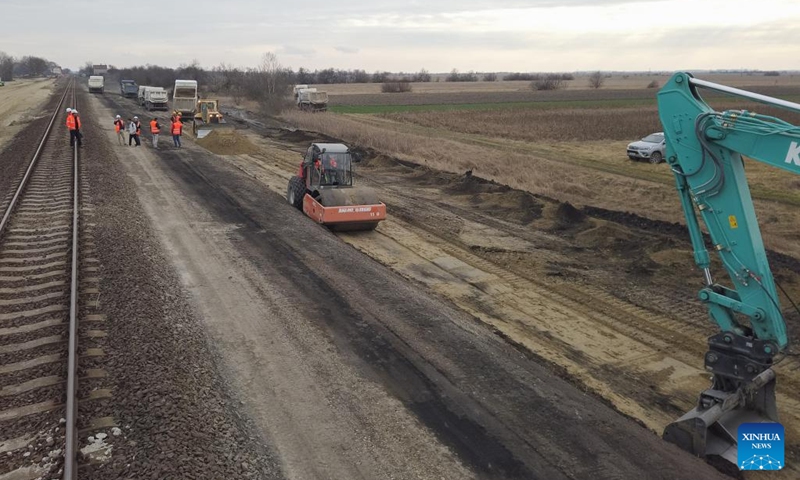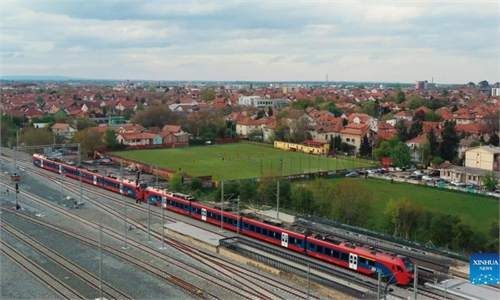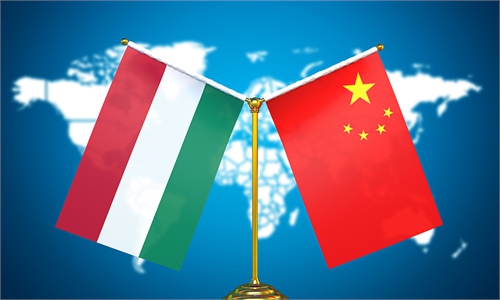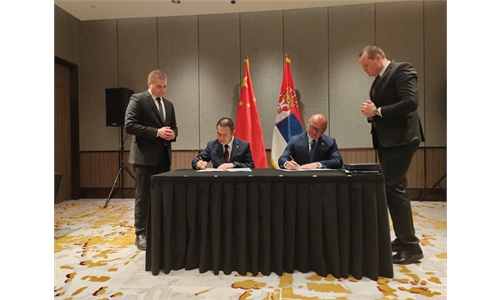China, Hungary sign five cooperation documents amid progressing relationship
Stable, progressing bilateral relationship offers demonstration effect: experts

Engineering vehicles are busy at a construction site of Hungary-Serbia railway project in Szabadszallas, Hungary, Feb. 22, 2023. At the offices, construction sites, or even out in the fields, experts, workers from different parts of the world joined together for their common goal that is to build and upgrade the railway linking Budapest in Hungary to Belgrade in Serbia, a major project under the Belt and Road Initiative (BRI), symbolizing deep cooperation between China and Europe. Photo: Xinhua
The National Development and Reform Commission (NDRC), China's top economic planner, and Hungarian authorities signed five cooperation documents on Monday covering various fields including jointly building the Belt and Road Initiative (BRI), along with other projects, the NDRC announced on Tuesday.
The two sides signed a second batch of priority cooperation projects for China and Hungary to jointly build the BRI in the second round. The two countries agreed to promote projects in fields such as infrastructure, industry, scientific research and development, and financing.
The two sides also signed four other memorandums of understanding, aiming to promote bilateral cooperation in industrial investment, the exchange of policies in economic development, green and low-carbon development, and the digital economy.
The signings embody a strong and established bilateral relationship while also signaling further elevated cooperation, especially against the backdrop of the ongoing third Belt and Road Forum for International Cooperation, Bao Jianyun, director of the Center for International Political Economy Studies at Renmin University of China, told the Global Times on Tuesday.
Chinese President Xi Jinping met with Hungarian Prime Minister Viktor Orban on Tuesday in Beijing. Xi stressed China's commitment to promoting a deep synergy of the BRI with Hungary's "Opening to the East" policy, and sharing development opportunities and achievements, the Xinhua News Agency reported.
The two sides should work for the on-time completion and operation of the Budapest-Belgrade Railway, Xi said. He also said that China stands ready to work with Hungary to continue to lead cooperation between China and Central and Eastern European Countries in the right direction and promote steady and sustained progress in China-Europe relations, according to Xinhua.
On the same day, CRRC Changchun Railway Vehicles Co and Serbia's Ministry of Construction, Transport and Infrastructure signed a contract for the procurement of five high-speed trains needed for the Budapest-Belgrade Railway, the company told the Global Times.
The deal also marks the first time for China's high-speed train system, which is capable of running at speeds of more than 200 kilometers per hour, to be exported to Europe, according to the company.
The Budapest-Belgrade Railway, linking the capitals of Hungary and Serbia, is a flagship project under the BRI between China and Central and Eastern European countries. The travel time will be shortened from eight hours to three hours after the project goes into operation.
Hungary will firmly support and continue to actively participate in the BRI, Orban said.
Experts said that the stable and progressing China-Hungary relationship will have a demonstration effect, especially because Hungary has participated in the BRI as an EU member and the country is a significant bridge connecting China with the Central and Eastern European Countries and with the EU.
Hungary has insisted on its own independent foreign policy with China, and it has been promoting cooperation based on an already established consensus, Cui Hongjian, a professor with the Academy of Regional and Global Governance at Beijing Foreign Studies University, told the Global Times on Tuesday, adding that the strong bilateral relationship has been established on a high level of political trust with mutual respect.
Cui also noted that the two sides have great common interests, especially in economic and trade development.
Mario Rendulić, president of the Presidency of the Chinese Southeast European Business Association, told the Global Times on Tuesday that the BRI has "provided a framework for enhanced cooperation, trade and investment between China and the CEE region."
According to Rendulić, the China-CEE cooperation mechanism, running in parallel with the BRI, has played a significant role in facilitating dialogue and cooperation in various areas, including infrastructure development, finance, agriculture and tourism.
Cui said that Hungary has well integrated the BRI as well as China's regional cooperation with Central and Eastern European countries, highlighting infrastructure construction.
For instance, the signature Budapest-Belgrade Railway will assist Hungary to find a sea gate through the China-Europe sea-land express transport, which will bring major benefits to boost its trade and economy, Cui noted.
Hungary was the first European country to sign a BRI cooperation document with China, Yang Chao, the Chinese Embassy's chargé d'affaires in Hungary, told the Global Times in an earlier interview. Hungary is one of China's most important trading partners in Central and Eastern Europe. Bilateral trade reached $15.52 billion in 2022, an increase of 84 percent from 2013, Yang said.
As of the end of 2022, China's direct investment in Hungary amounted to $426 million, involving trade, chemicals, finance, communications equipment, new energy, logistics and other industries, official data showed.
China and Serbia signed a free trade agreement on Tuesday, marking the first Central and East European country to sign an FTA with China, according to China's Ministry of Commerce. Serbia thus has become China's 29th FTA partner.



